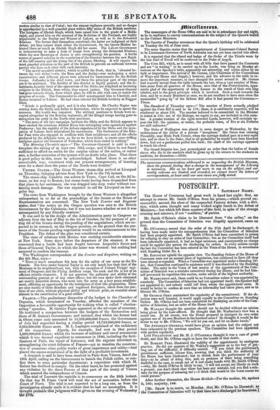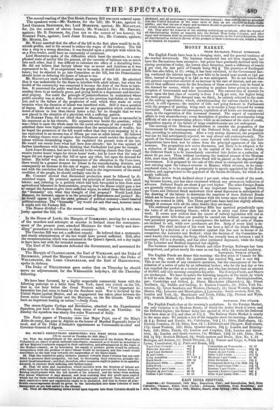POSTSCRIPT.
SATURDAY NIGHT.
The House of Commons had great work in hand last night: first, air attempt to rescue Mr. Smith O'Brien from his prison,—which proved un- successful; second, the close of the suspended Factory debate, with a divi- sion, which some, thought and many wished might result in the defeat of Ministers,—but which left them masters of 'the field, in spite of the strange crossing and mixture, if not " coalition," of parties.
Mr. Smith O'Brien's claim to be liberated from " the cellar," on the ground that the Committee of Selection was illegally appointed, came on first.
Mr. O'CoswELL moved that the order of the 27th April be discharged; it having been made under the misapprehension that the Committee of Selection had been properly appointed. Mr. Smith O'Brien had been committed to prison for refusing to obey an order of that Committee; but as the Committee itself had been informally appointed, it had no legal existence, and consequently no charge could lie against any person for disobeying its orders. In every session except the last the Committee has been entered in the Votes of the House, in accordance with Standing Order No. 4.
Mr. Esrcounr upheld the opposite view. The Standing Orders of the House of Commons were not an annual piece of legislation, but continued in force till they were altered or repealed. When a Committee was appointed under a Standing Or- der, that Committee continued in existence until it was dissolved by the Standing Order. The entry in the Votes of last session of the appointment of the Com- mittee of Selection was a mistake committed during his illness; and he had him- self prevented its repetition this session, under advice of the highest authority. - Mr. WARBURTON said, there could be no Committee unless it was appointed by somebody. The Committee of Selection had not appointed itself; the Speaker had not appointed it; and nobody could tell from whom the appointment came. It would be better to confess at once that an informality had taken place, and so to liberate Mr. O'Brien.
Sir GEORGE GREY maintained the regularity of the commitment. If the ob- jection were well founded, it would apply equally to the Committee on Standing Orders. Mr. O'Brien had not been committed for disobeying an order of the Com- mittee of Selection, but an order of the House itself. Mr. WAKLEY thought the question should not be decided without an opinion. being given by the Law-officers. He thought that Mr. Warburton's view was a sound one. At all events, was the House prepared to interpret its own order against one of its own Members in the harshest sense ? Ile thought it would be W- hetter to say to Mr. O'Brien, " We will let you out, and let us shake hands."
The Arromery-Grieram, would have given an opinion had the subject not been exhausted by the previous speakers. The Committee had been appointed. with perfect regularity. Lord POLLINGTON and Mr. M. J. O'CoxicELL thought it was a case of great doubt„ and that Mr. O'Brien ought to have the benefit of that doubt.
Sir ROBERT PEEL illustrated the validity of the appointment by analogous. practice. He did not approve of Mr. Wakley's suggestion as to the way of get-, ting ,, . out of the difficulty, if difficulty existed. If you think the gentleman'!; punishment sufficient, release him, avowing that you think the authority of the House has been vindicated: but to shrink from the performance of your duty—to be afraid of doing this, and, on pretence of there being something doubtful in the case, to sneak out of it and shake hands with Mr. Smith O'Brien —why, Mr. Smith O'Brien is likely to say, I will not accept my liberty on such a ground; you don't think that there has been any mistake, but you find a mis- take for the purpose of releasing me';—I think that would be the worst course we could pursue." After further discussion, the House divided—For the motion, 36, against it, 180; majority, 144. [Mr. SHAW is to move, on Monday, that Mr. O'Brien be liberated; as the Committee of Selection will by that time have discharged its functional
The second reading of the Ten Hours Factory Bill was next entered upon.
The speakers were—Mr. Baete.xa, for the bill; Mr. WARD, against it; Lord GEORGE BENTINCK, for; Lord MORPETH, against; Mr. MACAULAY, for, (to the extent of eleven • hours); Mr. WAKLEY, for; Mr. BRIGHT, against; Mr. B. DENISON, for, (but not to the extent of ten hours); Sir ROBERT PEEL, against; Lord JOHN RUSSELL, for; Mr. COBDEN, against; Mr. MUNTZ, for.
Mr. WARD asserted that the effect of the bill in the first place would be to di- minish profits, and in the second to reduce the wages of the workers. The bill was a step in a wrong direction; it was founded upon a principle with which he, as a Free-trader, could have no community of sentiment. Lord MORPETH spoke of the difficulties which beset the question; in a com- plicated state of society like the present, all the currents of business ran so much into each other, that it was difficult to calculate the effect of a disturbing force. He did not believe that factory labour was so severe and injurious as it was represented to be. If an experiment was to be made, it should not exceed eleven hours; but he objected to go into Committee on the bill, lest the Protectionists should insist on reducing the hours of labour to ten.
Mr. hiacauLAY made a brilliant speech in support of the bill. He admitted that it was undesirable for the State to interfere with adult labour; but when the health of the community was concerned it became the duty of the State to inter- fere. It concerned the public weal that the people should not live a wretched life, sending them to an untimely grave, and giving-birth to a degenerate and deterior- ated progeny. Nor could the principle of ;noninterference be maintained where public morality was'
as at stake. He referred to the previous legislation on the sub- ject, and to the failure of the prophecies of ruin which were made on every occasion when the duration of labour was interfered with. Still it was a question of degree. He should not vote at present for any proposition which reduced the hours of labour to less than eleven hours a day; for be thought that we were now placed in the situation of a physician with a suffering patient. Sir ROBERT PEEL did not think that Mr. Macaulay had been so successful in his argument as in his rhetoric. His argument was beside the question; which was—what is upon the whole most for the social advantage of the country? He admitted there were higher considerations than the accumulation of wealth; but he hoped the promoters of the bill would reflect that they were imposing by it a tax equivalent to an income-tax of fifteen per cent on adult labour. He believed the working classes were of opinion that Parliament could restrict the duration of labour without diminishing wages. He explained the present state of the law. He would not recede from what had been done already; but he was against all farther interference with labour, thinking that Parliament had gone far enough. Lord JOHN &rasa'n had never held out to the working classes that they would receive twelve hours' wages for eleven hours' work; but he knew that the rate of wages did not depend upon this bill or upon any other, but upon the demand for labour. His belief was, that in consequence of the alteration in the Corn-laws, there would be a greater demand for Tabour in the manufacturing districts, and consequently an increase in the rate of wages; and with that belief on his mind, and with the conviction that this bill would tend to the improvement of the social condition of the people, be should cordially vote for it. Mr. COBDEN showed that diminished production must be followed by di- minished wages. He protested against the principle of interference with adult labour; and, referring to a petition which had been forwarded to him from some agricultural labourers in Somersetshire, praying that the House might pass a law to compel the farmers to give them sufficient wages, he asked those who had raised the " humanity" cry, what they thought of that proposal ? Would Lord John Manners, for instance, oppose it on the principle of benevolence and justice? No; be would oppose it upon the strict grounds of political economy—hard-hearted political economy. The "humanity" cry would not suit that case, however much it might suit the Factory Bill. • The House divided—For the second reading, 193; against it, 203; ma- jority against the bill, 10.



























 Previous page
Previous page